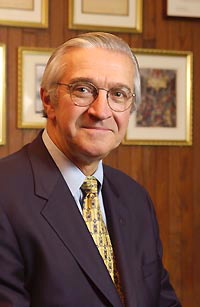|
This is an archived article.
For the latest news, go to the
Advance Homepage
For more archives, go to the Advance Archive/Search Page. | ||
|
Walking the halls of John Dempsey Hospital and our outpatient clinics these past few weeks, I find myself looking around and thinking that we are in the final days of an era. I say this without any trace of melancholy. Change has been the unspoken motto that has characterized the Health Center during the past several years. Without belaboring the point, we needed to change quickly and substantially. We embraced the multiple challenges that confronted us, and today we are a better, stronger organization.
Change has been a part of our everyday work lives for some time, but to anyone who thinks that the bulk of the changes are now behind us, all I can say is, "wait till you see what's coming." After considerable planning, preparation, and investment, we will soon embark on a change that rivals any I've witnessed in my 37 years of practicing medicine. It is with great enthusiasm that I welcome the introduction of our new Patient Safety System to the Health Center's clinical enterprise. Make no mistake, this is a big one! By the time it is fully implemented, the project will directly affect nearly everyone working in our clinical enterprise. The new Patient Safety System required us to make a $15 million investment for what is without question the most comprehensive and complex information technology undertaking in the Health Center's history. Above all, it will enable us to provide an unparalleled level of safety for all our patients. The new system will allow us to automate the basic processes of patient care and effect significant efficiencies. Said another way, we'll be moving from the traditional paper-based system of providing care to one that is nearly paperless. While this, in and of itself, is certainly necessary, the overriding benefit to our patients is of critical importance. The use of current technology to prevent patient care errors is, in my mind, all the justification we need. Few will disagree that patient safety is one of the most talked-about topics in medicine today. Recent, well-publicized events at Johns Hopkins Health System, Duke University Medical Center, and Children's Hospital Boston illustrate that medical errors can - and do - occur at even the most highly regarded medical institutions in the country. So while the United States still offers the finest health care in the world, one needs to look no further to understand the erosion of public trust in the medical profession. We at the UConn Health Center are fully aware that the practice of medicine must change in order to improve patient safety. That means we must change. Better systems, electronic and otherwise, are needed to help prevent medical errors from occurring and causing harm to patients. We know that the nation's Academic Medical Centers must be the ones to set the pace and serve as a model for others to follow. At the heart of every new patient safety system, including ours, is Computerized Physician Order Entry (CPOE). Under CPOE, physician orders will be integrated with a patient's medical history as well as current laboratory and drug information. In addition to improving the standardization and efficiency of care, it is estimated that CPOE will eliminate more than 50 percent of serious medical errors and decrease adverse events by almost 20 percent. CPOE is not an option or a luxury; it is a necessity! To get there, our physicians, nurses, and other staff will need to work in ways that were unthinkable just a short while ago. Instead of writing and relying on paper records, they will be keyboarding and getting data from monitors. What is already commonplace in so many other professions will very soon become the norm in patient care at the UConn Health Center. This change will not take place overnight. Training, practice, and system conversions will require great care and orchestration. As with any change of this magnitude, there will come a point when the old way will disappear and the new way will be the only way - for everyone. That includes me. I've already heard comments that some of us who are "more experienced" will find it difficult, if not impossible, to adapt to the new system. Let me offer this to anyone who has doubts. If there was ever a reason to embrace change in our profession, this is it. From everything I've seen thus far, the changes required of us have more to do with one's attitude than one's aptitude. We must remind ourselves why this change is taking place and what it ultimately means to our patients. I am confident we will adapt with all the professional ism our patients have come to expect from us. Training gets underway in January. Be peaceful. |

